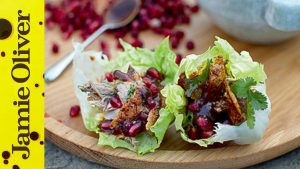Guanabana, also known as soursop, is a tropical fruit native to South America, Central America, and the Caribbean. It is becoming increasingly popular around the world due to its unique flavor and numerous health benefits. In this article, we will explore the benefits of guanabana in detail.
-
High in Nutrients
Guanabana is rich in various nutrients that are essential for a healthy body. It contains vitamin C, vitamin B1, vitamin B2, and vitamin B3, as well as calcium, iron, and phosphorus. It is also a good source of dietary fiber, which helps to promote healthy digestion.
-
Boosts Immune System
Vitamin C is known for its ability to boost the immune system, and guanabana is an excellent source of this vitamin. It helps to protect the body against infections and illnesses by stimulating the production of white blood cells, which are essential for fighting off pathogens.
-
Anti-Cancer Properties
Guanabana has been found to have anti-cancer properties. Several studies have shown that the fruit contains compounds that can help to kill cancer cells, particularly those associated with breast, lung, and colon cancers. These compounds work by inhibiting the growth and spread of cancer cells, while leaving healthy cells unharmed.
-
Promotes Healthy Digestion
Guanabana is a good source of dietary fiber, which is essential for healthy digestion. It helps to prevent constipation and promotes regular bowel movements. Additionally, the fruit contains compounds that have been found to help reduce inflammation in the digestive tract, which can help to alleviate symptoms of inflammatory bowel disease.
-
Supports Heart Health
Guanabana contains compounds that have been found to support heart health. These compounds help to lower blood pressure and reduce the risk of heart disease. Additionally, the fruit contains potassium, which is essential for maintaining a healthy heart rhythm.
-
May Help to Lower Blood Sugar
Guanabana has been found to have hypoglycemic effects, meaning that it can help to lower blood sugar levels. This is particularly beneficial for individuals with diabetes, as it can help to reduce the risk of complications associated with high blood sugar.
-
Anti-Inflammatory Properties
Guanabana contains compounds that have been found to have anti-inflammatory properties. These compounds help to reduce inflammation throughout the body, which can help to alleviate symptoms of conditions such as arthritis and asthma.
-
Promotes Healthy Skin
Guanabana contains vitamin C, which is essential for healthy skin. It helps to promote the production of collagen, which is a protein that gives skin its elasticity. Additionally, vitamin C helps to protect the skin against damage from UV rays and environmental pollutants.
-
May Help to Improve Mood
Guanabana contains compounds that have been found to help improve mood. These compounds work by increasing the production of serotonin, a neurotransmitter that is associated with feelings of happiness and well-being.
-
Supports Healthy Brain Function
Guanabana contains compounds that have been found to support healthy brain function. These compounds help to protect the brain against damage from oxidative stress, which is a process that can lead to cognitive decline and neurodegenerative diseases such as Alzheimer’s.
-
May Help to Reduce Anxiety
Guanabana has been found to have anxiolytic effects, meaning that it can help to reduce anxiety. This is particularly beneficial for individuals who suffer from anxiety disorders, as it can help to alleviate symptoms such as nervousness and restlessness.
-
Anti-Parasitic Properties
Guanabana has been found to have anti-parasitic properties. Several studies have shown that the fruit contains compounds that can help to kill parasites, particularly those associated with malaria.
Nutritional Facts of Guanabana
Guanabana, also known as soursop, is a tropical fruit that is popular in many parts of the world. Here are some of the nutritional facts of guanabana:
- Calories: 1 cup (225 grams) of guanabana contains approximately 148 calories.
- Carbohydrates: Guanabana is a good source of carbohydrates, with one cup providing about 37 grams of carbohydrates.
- Fiber: One cup of guanabana contains approximately 7 grams of dietary fiber, which is about 28% of the daily recommended intake.
- Protein: Guanabana is not a significant source of protein, with one cup containing only 2.3 grams.
- Fat: Guanabana is a low-fat fruit, with less than 1 gram of fat per cup.
- Vitamins: Guanabana is rich in several vitamins, including vitamin C, vitamin B6, and thiamine (vitamin B1).
- Minerals: Guanabana is also a good source of minerals like potassium, magnesium, and copper.
- Antioxidants: Guanabana is a rich source of antioxidants like acetogenins, which are believed to have anticancer properties.
It is important to note that guanabana should be consumed in moderation due to its high sugar content. However, as part of a balanced diet, guanabana can be a nutritious addition to your diet.































